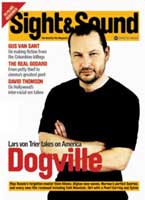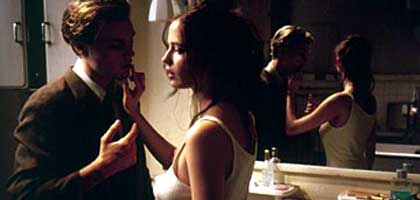
The Dreamers
France/UK/Italy/USA 2003

Reviewed by Ginette Vincendeau
Synopsis
Our synopses give away the plot in full, including surprise twists.
Paris, 1968. In February, Matthew (Michael Pitt), a young American, meets French twins Théo (Louis Garrel) and Isabelle (Eva Green) at the Cinémathèque Francaise during a demonstration against the sacking of its head, Henri Langlois. Matthew is elated when they invite him to dinner in the family apartment, where he meets their English mother (Anna Chancellor) and French father (Robin Renucci). Matthew is invited to stay when the parents depart, and the three friends begin a life of reclusive bohemia. They discuss politics and play film-buff and, increasingly, sexual games. Isabelle makes Théo masturbate in front of them; later Théo orders Matthew and Isabelle to have sex, whereupon Matthew discovers she was a virgin.
Matthew falls in love with her. Wishing to break her closeness to her brother, which at times appears incestuous, he takes her out, but when they find Théo with a woman, Isabelle has a jealous fit. Later she builds a tent in the sitting room, under which they all sleep. The parents unexpectedly return but, shocked by the state of the flat, immediately leave. Isabelle wakes up, realises her parents have visited and turns the gas on to kill them all. A paving stone thrown by a May rioter breaks the window and saves them from being gassed. Despite Matthew's reluctance, Isabelle and Théo join the street battle.
Review
Bernardo Bertolucci's latest film, his 22nd, is the story of a young ménage à trois - between American Matthew and French twin brother and sister Théo and Isabelle - against the background of the May '68 events in Paris. After being shown at the Venice festival, it comes to us with a faint whiff of scandal. Bertolucci has accused distributor 20th Century Fox of wanting to "amputate and mutilate" his film, the fuss being over a few brief moments of - male and female - frontal nudity. Although the idea of cutting these passages is ridiculous by today's standards, the episode points to the way sex is a greater preoccupation in the film than the political events unfolding at the same time. Yet the real strength of the film is elsewhere.
Bertolucci describes The Dreamers as being about three utopias centred around his memories of May '68: political, cinematic and sexual, and by far the most engaging aspect of the film is its celebration of cinema. The film opens with Matthew on his way to a screening at the Cinémathèque in the Palais de Chaillot in February 1968. He finds it closed because of the 'Langlois affair' - a protest on the part of film-makers and filmgoers at the sacking of the Cinémathèque's famous director. The event was widely seen as a harbinger of the May student uprising. In a wonderful elegiac montage, Bertolucci splices together archive shots of Jean-Pierre Léaud giving a passionate speech in defence of Langlois, with his own shots of Léaud today reproducing the same event (the use of Léaud also recalls Bertolucci's own Last Tango in Paris , 1972).
Later on he uses a different but related technique, marrying shots of the characters recreating passages from films with shots of the films themselves. These include classics such as Queen Christina (1933) and Blonde Venus (1932), and New Wave films. So we see extracts from À bout de souffle (1959) while Isabelle mimics Jean Seberg's call of " New York Herald Tribune " in that movie, hear the music from Les Quatre cents coups (1959) over shots of Paris, and see the three heroes running through the Louvre to imitate the protagonists of Godard's Bande à part (1964). Similarly Bertolucci's heroes talk about Nicholas Ray and argue the relative merits of Keaton and Chaplin. In this respect, what the film celebrates is not so much cinema, as cinephilia .
In a more pervasive way, The Dreamers is suffused with references to Last Tango in Paris , and Jean-Pierre Melville's adaptation of Jean Cocteau's novel Les Enfants terribles (1949). From the first comes the large Parisian apartment transformed into a theatrical set (including in each case a scene in a bath) and, of course, an element of sexual experimentation. From the second, Bertolucci takes the incestuous play between grown-up brother and sister and the notion of elaborate games in a world of prolonged adolescence. Théo's forfeit for failing to answer a film trivia question is to masturbate in front of the others. Likewise, when Isabelle and Matthew make love for the first time, it is the result of a game, though it develops temporarily into something more serious. The problem is that, where the sexual experimentation of Last Tango had a raw edge, and in Les Enfants terribles the force of the drama was partly its containment of sexual energy, The Dreamers offers three contemporary adolescents having sex - hardly news in the context of 2004.
Last Tango in Paris also drew its mesmerising appeal from Marlon Brando's menace and Maria Schneider's vulnerability. Here all three actors are adequate (Eva Green) to good (Michael Pitt) and very good (Louis Garrel), but they lack intensity and incisiveness - the recreation of the sexual utopia of 1968 is too overlaid with subsequent permissiveness to be meaningful, and the three protagonists appear spoilt rather than daring. Ironically too the film's sexual politics are more conventional than those of Les Enfants terribles . Elisabeth in that film is a deathly but powerful figure, controlling her immature brother. By contrast in The Dreamers , Isabelle is a virgin (whom Matthew almost instantly brings to ecstasy); when we finally see her 'secret' bedroom, it reveals her petit-bourgeois and 'girly' tastes - just as in Last Tango in Paris the bourgeois Jeanne was a foil to the dangerous allure of macho rebel Paul.
And May '68 in all this? Bertolucci rightly claims not to have made a film about politics (he also toned down some of the social detail in Gilbert Adair's source novel). The image of the students' paving stone breathing fresh air into the morbid bourgeois flat is neat. But Théo's instant transformation from armchair Maoist and domestic slob to ardent militant is glib, his visit to the Sorbonne a nod to a cliché iconography rather than an accurate depiction of events, and money and food shortages figure only in the sense that the three are reduced to drinking papa's vintage Bordeaux.
The Dreamers looks wonderful. The superb Parisian flat is photographed in fluid takes and with exquisite lighting. The soundtrack is a pleasurable 1960s pot-pourri (The Doors, Jimi Hendrix), although with a few exceptions (Françoise Hardy), the featured French music is anachronistic chanson ('Je ne regrette rien', 'La mer') rather than the French popular music of the time. And I don't think it is just chauvinism that makes me point out that, coming hot on the heels of the Merchant Ivory comedy Le Divorce , The Dreamers equally - but more surprisingly - portrays French characters as uniformly vain, pretentious and unpleasant. Only the American Matthew seems to have any sense or sensibility. In Le Divorce the French attraction was Hermès bags and gourmet restaurants. In The Dreamers , it is the aura of rebellion and cinephilia in a sublime domestic setting. In The Dreamers , to be a May '68 revolutionary is a lifestyle issue.
Credits
- Director
- Bernardo Bertolucci
- Producer
- Jeremy Thomas
- Screenplay
- Gilbert Adair
- Based on his novel The Holy Innocents
- Director of Photography
- Fabio Cianchetti
- Editor
- Jacopo Quadri
- Production Designer
- Jean Rabasse
- Music Supervisor
- Janice Ginsberg
